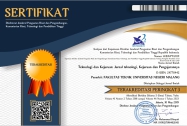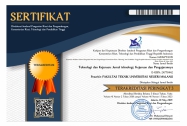The Role of Vocational Education in Indonesia's Economic Development
Abstract
Education, including vocational education, has an essential role in the development of complete human beings and the development of the Indonesian people as a whole. Human development must be done intact, which includes the development of thinking power, emotional intelligence, physical power, and mastery of science, technology, art and sport. Besides, human development is also expected to produce human capable of and able to play an active role in building the entire Indonesian society. The success or failure of the role of vocational education can be measured from the balance of these two objectives; there is the development of the whole person and the development of the entire Indonesian society. More specifically, the purpose of vocational education includes four main dimensions: Developing basic human qualities that include the quality of thinking power, emotional intelligence, physical power, to develop the instrumental quality/functional quality, namely the mastery of science, technology, art, and sport, strengthening identity as the nation of Indonesia, and maintaining the survival and development of the world. The following outlined the dimensions of the purpose of vocational education.
Keywords
Full Text:
PDFReferences
Asian Development Bank. (2009). Good Practice in Technical and Vocational Education and Training. Manila, Philippines: ADB
Becker, G.S. (1964). Human Capital. New York, NY: National Bureau of Economic Research.
Boediono & McMahon. (2001). Development of Education to Support Economic Growth. Agency for Research and Development. Jakarta: Ministry of Education and Culture.
Ministry of Manpower and Transmigration. (2010). Alignment of Education, Training with the World of Work. Jakarta: Ministry of Manpower and Transmigration.
Nasir, S. B. (2012). Strategy to Revitalize Technical and Vocational Education and Training (TVET): Management Perspectives. Global Journal of Management and Business Research,12(23):11-14.
Psacharopoulous, G. (1986). Education for Development: An Analysis of Investment Choices. Washington, DC: The World Bank.
Psacharopoulous, G. (1987). To Vocationalize or Not to Vocationalize: That is the Curriculum Question. Internationale Review of Education, 33(2), p.187-211.
Psacharopoulous, G. (1994). Returns to Investment in Education: A Glossary Update. World Development, 22 (9), 1325-1343.
Psacharopoulous, G. (1997). Vocational Education and Training Today: Challenges and Responses. Journal of Vocational Education and Training, 49(3), 385-393.
Slamet PH. (2010). Entrepreneurship. Upgrading School Supervisor Papers. Jakarta: Ministry of National Education.
DOI: http://dx.doi.org/10.17977/um031v43i22020p130-134
Refbacks
- There are currently no refbacks.
Copyright (c) 2020 Teknologi dan Kejuruan: Jurnal Teknologi, Kejuruan, dan Pengajarannya
Teknologi dan Kejuruan: Jurnal Teknologi, Kejuruan, dan Pengajarannya
E-ISSN 2477-0442 (online)
Contact
Faculty of Engineering, Universitas Negeri Malang (UM)
Jl. Semarang No 5 Malang 65145, Building H5, 1st Floor.
Homepage: http://journal2.um.ac.id/index.php/teknologi-kejuruan
Email: teknologikejuruan.ft@um.ac.id

This work is licensed under a Creative Commons Attribution 4.0 International License.



2.png)
1.png)
1.png)
1.png)
4.png)
1.png)
.png)

3.png)
1.png)
1.png)


